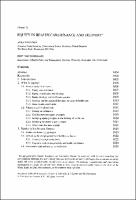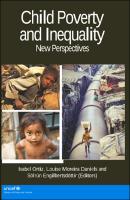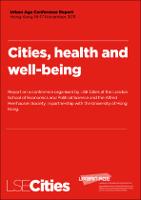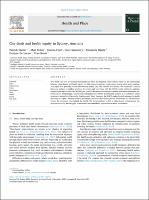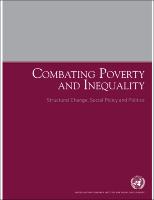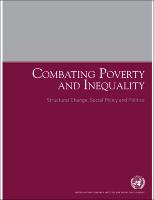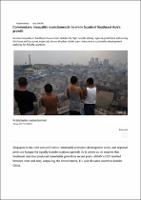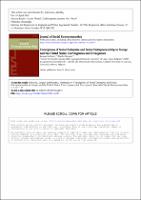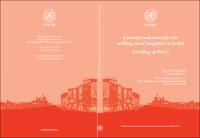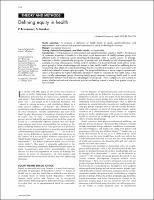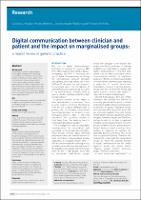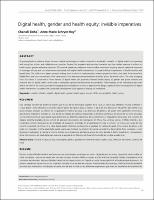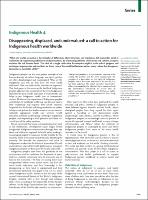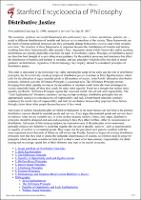Browsing by Title
Now showing items 47-66 of 229
-
Chapter 11: Ethics and Health
(Community -focused nursing) -
Chapter 34 Equity in health care finance and delivery
(Handbook of Health Economics, 2000)
The paper surveys the economics literature on equity in health care financing and delivery. The focus is, for the most part, on empirical work, especially that involving intemational and temporal comparisons. There is, however, some discussion of the concept and definition of equity. The empirical sections cover the literature on equity in health care financing (progressivity and horizontal equity of health care financing arrangements), equity in health care delivery (horizontal equity in the sense of treating persons in equal need similarly), ... -
Child Poverty and Inequality: New Perspectives
(2012)
The 21st century starts with vast inequalities for children in terms of income, access to food, water, health, education, housing, or employment for their families. Half of the world’s children are below the poverty line of $2 a day and suffer from multiple deprivations and violations to basic human rights. More than 22,000 children die each day, and most of their deaths are preventable. This volume presents some of the critical acknowledged voices to move a necessary agenda forward. It explains multidimensional poverty measurements, describes ... -
Cities, health and well-being
(2012)
Cities are critical sites for enquiry and action in relation to health and well-being. With up to 70 per cent of the world’s population estimated to be living in urban areas by 2050, global health will be determined increasingly in cities. In response to these challenges, the 2011 Urban Age Hong Kong conference, organized by the London School of Economics and Political Science and the Alfred Herrhausen Society in partnership with the University of Hong Kong, brought together over 170 planners, architects, sociologists, medical doctors, public ... -
City deals and health equity in Sydney, Australia
(2022-01)
City Deals’ are new governance instruments for urban development. Vast evidence exists on the relationship between urban factors and health equity, but little research applies a health equity lens to urban policy-making. This paper does precisely that for the Western Sydney City Deal (WSCD) in Australia. We conducted a critical discourse analysis of publicly available documents and interviews with the WSCD’s main architects, applying insights from relevant theories. We find ‘pro-growth’ discourse to encourage economic investment dominates any ... -
Closing the health equity gap: policy options and opportunities for action
(World Health Organization, 2013)
This report, which highlights policy options for consideration within national discussions, was developed in conjunction with WHO regional offices and others across the Organization who are working on the social determinants of health and equity issues. The general approach to the report was discussed at a seminar within WHO’s Information, Evidence and Policy cluster and with WHO regional advisors following the release of the final report of the Commission on Social Determinants of Health in August 2008. In January 2009 the 124th session of the ... -
Combating poverty and inequality: structural change, social policy and politics
(United Nations Research Institute for Social Development, 2010)
Poverty reduction is a central feature of the international development agenda and contemporary poverty reduction strategies increasingly focus on “targeting the poor”, yet poverty and inequality remain intractable foes. Combating Poverty and Inequality argues that this is because many current approaches to reducing poverty and inequality fail to consider key institutional, policy and political dimensions that may be both causes of poverty and inequality, and obstacles to their reduction. Moreover, when a substantial proportion of a country’s ... -
Combating poverty and inequality: structural change, social policy and politics
(United Nations Research Institute for Social Development, 2010)
Poverty reduction is a central feature of the international development agenda and contemporary poverty reduction strategies increasingly focus on “targeting the poor”, yet poverty and inequality remain intractable foes. Combating Poverty and Inequality argues that this is because many current approaches to reducing poverty and inequality fail to consider key institutional, policy and political dimensions that may be both causes of poverty and inequality, and obstacles to their reduction. Moreover, when a substantial proportion of a country’s ... -
Commentary: Inequality looms beneath the shiny facade of Southeast Asia's growth
(CNA, 2017-04-23) -
Conceptions of Social Enterprise and Social Entrepreneurship in Europe and the United States: Convergences and Divergences
(Journal of Social Entrepreneurship, 2010)
The concepts of social enterprise and social entrepreneurship are making amazing breakthroughs in EU countries and the United States. Until recently, the debates on both sides of the Atlantic have taken place in parallel trajectories with few connections among them. In the first part of the paper, we describe the European and US historical landscapes in which those concepts took root. In the second part, we analyse how the various conceptualizations have evolved. This analysis paves the way for the third part, in which we highlight the conceptual ... -
Costa Ricans Live Longer Than Us. What’s the Secret?
(2021-08-30) -
Deconstructing development discourse: buzzwords and fuzzwords
(Practical Action Pub. ; Oxfam, 2010)
"Writing from diverse locations, contributors critically examine some of the key terms in current development discourse. Why should language matter to those who are doing development? Surely, there are more urgent things to do than sit around mulling over semantics? But language does matter. Whether emptied of their original meaning, essentially vacuous, or hotly contested, the language of development not only shapes our imagined worlds, but also justifies interventions in real people's lives. If development buzzwords conceal ideological differences ... -
Defining equity in health
(Journal of Epidemiology & Community Health, 2003)
Study objective: To propose a definition of health equity to guide operationalisation and measurement, and to discuss the practical importance of clarity in defining this concept. Design: Conceptual discussion. Setting, Patients/Participants, and Main results: not applicable. Conclusions: For the purposes of measurement and operationalisation, equity in health is the absence of systematic disparities in health (or in the major social determinants of health) between groups with different levels of underlying social advantage/disadvantage—that ... -
Demystifying rising inequality in Asia
(Asian Development Bank Institute, 2019)
Income inequality is one of the most profound social, economic, and political challenges of our time. The gap between the rich and the poor has been regarded as a major concern for policy makers. This gap is at its highest level in decades for developed economies, while the inequality trend has been rising in many developing countries. In Asia, despite recent economic growth, income distribution has been worsening as well. This book contributes to the existing literature on inequality in Asia by overviewing the new trend of inequality in Asia and ... -
Demystifying rising inequality in Asia
(Asian Development Bank Institute, 2019)
Income inequality is one of the most profound social, economic, and political challenges of our time. The gap between the rich and the poor has been regarded as a major concern for policy makers. This gap is at its highest level in decades for developed economies, while the inequality trend has been rising in many developing countries. In Asia, despite recent economic growth, income distribution has been worsening as well. This book contributes to the existing literature on inequality in Asia by overviewing the new trend of inequality in Asia and ... -
Digital communication between clinician and patient and the impact on marginalised groups: a realist review in general practice
(British Journal of General Practice, 2015-12)
Background Increasingly, the NHS is embracing the use of digital communication technology for communication between clinicians and patients. Policymakers deem digital clinical communication as presenting a solution to the capacity issues currently faced by general practice. There is some concern that these technologies may exacerbate existing inequalities in accessing health care. It is not known what impact they may have on groups who are already marginalised in their ability to access general practice. Aim To assess the potential impact of the ... -
Digital health, gender and health equity: invisible imperatives
(Journal of Public Health, 2018-12-01)
A growing body of evidence shows the use of digital technologies in health—referred to as eHealth, mHealth or ‘digital health’—is improving and saving lives in low- and middle-income countries. Despite this prevalent and persistent narrative, very few studies examine its effects on health equity, gender and power dynamics. This journal supplement addresses these invisible imperatives by going beyond traditional measures of coverage, efficacy and cost-effectiveness associated with digital health interventions, to unpack different experiences of ... -
Distributive Justice
(2017-09-26)


